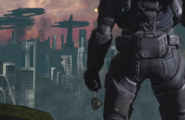Dog tag: Difference between revisions
From Halopedia, the Halo wiki
No edit summary |
Forerunner (talk | contribs) No edit summary |
||
| Line 7: | Line 7: | ||
Historically, dog tags were simple metal plates attached to necklaces. However, it is likely that with new technology developed since our time, the current design of dog tags was changed. The purpose of the dog tag is to provide information when it is most critical. This includes the soldier's name, rank, service number, and blood type should they be injured and need medical treatment. | Historically, dog tags were simple metal plates attached to necklaces. However, it is likely that with new technology developed since our time, the current design of dog tags was changed. The purpose of the dog tag is to provide information when it is most critical. This includes the soldier's name, rank, service number, and blood type should they be injured and need medical treatment. | ||
Usually, dog tags are removed from a fallen soldier to identify and later report their death, without the need to carry the body, as this would be virtually impossible in a combat situation. For example, in his trek through the [[Library]], [[Master Chief]] found a dead marine named [[Marvin Mobuto]], and took his dog tags. Dog tags are supplemented by [[Neural Interface]]s, which are capable of displaying basic information for identification and additional information on a soldier's [[Wikipedia:Vital signs|vital signs]]. This information is accessed via a [[ | Usually, dog tags are removed from a fallen soldier to identify and later report their death, without the need to carry the body, as this would be virtually impossible in a combat situation. For example, in his trek through the [[Library]], [[Master Chief]] found a dead marine named [[Marvin Mobuto]], and took his dog tags. Dog tags are supplemented by [[Neural Interface]]s, which are capable of displaying basic information for identification and additional information on a soldier's [[Wikipedia:Vital signs|vital signs]]. This information is accessed via a [[heads-up display|heads up display]]. Dog tags are useful in that they do not require a heads up display to access basic identification information. Orbital Drop Shock Troopers, more commonly referred to as ODSTs, have their name, rank, service number and blood type on a sticker on their shoulder, instead of dog tags, although this might simply be redundancy for easier identification. | ||
==Gallery== | ==Gallery== | ||
<gallery> | <gallery> | ||
Revision as of 13:50, December 15, 2010
Template:Ratings Template:SeeWikipedia
Dog tags are simple identification devices that have been used by military forces for centuries. This practice of identification has continued in the UNSC Defense Force.[1]
Historically, dog tags were simple metal plates attached to necklaces. However, it is likely that with new technology developed since our time, the current design of dog tags was changed. The purpose of the dog tag is to provide information when it is most critical. This includes the soldier's name, rank, service number, and blood type should they be injured and need medical treatment.
Usually, dog tags are removed from a fallen soldier to identify and later report their death, without the need to carry the body, as this would be virtually impossible in a combat situation. For example, in his trek through the Library, Master Chief found a dead marine named Marvin Mobuto, and took his dog tags. Dog tags are supplemented by Neural Interfaces, which are capable of displaying basic information for identification and additional information on a soldier's vital signs. This information is accessed via a heads up display. Dog tags are useful in that they do not require a heads up display to access basic identification information. Orbital Drop Shock Troopers, more commonly referred to as ODSTs, have their name, rank, service number and blood type on a sticker on their shoulder, instead of dog tags, although this might simply be redundancy for easier identification.
Gallery
Jorge-052's dog tags, as seen in Halo: Reach.
Sources
- ^ Halo: The Flood, page 225: "He paused to recover their dog tags, scavenged some ammo, and kept on going."
